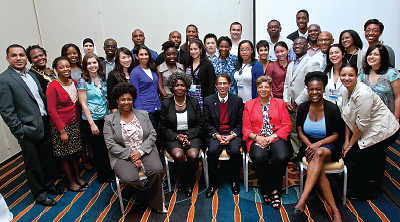Fellowship’s Good Works Highlighted in New Video
Abstract
A video marking the 40th anniversary of the APA/SAMHSA Minority Fellowship Program shows how a small number of residents can impact thousands so profoundly.
A video presentation showcasing the initiatives of the APA/SAMHSA Minority Fellowship Program is set to air at APA’s 2013 annual meeting this month. The video highlights the innovative work of the fellows as it is conducted in locales as varied as barbershops and primary care clinics.

APA/SAMHSA Minority Fellows gather at their annual awards presentation and reception at last year’s annual meeting. Shown in the front row are Melissa Maitland, M.D., Annelle Primm, M.D., Dilip Jeste, M.D., Marilyn King, Yasmin Owusu, M.D., and Shana Gage, M.D. Primm is director of APA’s Office of Minority and National Affairs, and Jeste is APA president.
The fellowship provides psychiatry residents with specialized training in culturally competent care and provides them with funds to reach out to minority populations in creative ways in an attempt to reduce mental health care disparities.
“The video is designed to pique interest in the fellowship and demonstrate how the program affects often marginalized minority communities all over the U.S.,” said Michelle Durham, M.D., M.P.H., in an interview with Psychiatric News. Durham is an APA/SAMHSA Minority Fellow and a child and adolescent psychiatry fellow at the Yale Child Study Center and pitched the idea of the video to other fellows and APA leaders last year. Durham worked closely with Let’s Imagine Health, the company that produced and directed the video, and helped raise funding for it from the fellows and from APA’s Office of Minority and National Affairs (OMNA).
“We hope the film will encourage students and trainees to consider applying for this fellowship, inspire viewers to get involved in their respective communities, and foster greater understanding of minority groups and the pressing mental health issues that affect them,” Durham said.
Barbers May Help Screen Clients
The video is approximately 10 minutes long and features the work of five minority fellows who are interviewed on camera. One of the fellows featured in the video, Teo-Carlo Straun, M.D., is an addiction psychiatry fellow at Yale University and is using the fellowship funds to run a program he started in tandem with Mosaic, a nonprofit organization in Worcester, Mass. Straun serves as medical director of Barbershop Health Outreach Program, which screens clientele of participating barbershops in Worcester for mental illness, substance use disorders, and cardiovascular diseases.
“Barbers already have strong, trusting relationships with their clients,” Straun said. “Their clients are open with them and speak about news, politics, and what’s going on in their own lives,” Straun said. He worked with the local barbers so that they could effectively elicit information from their clients about diet, exercise, sleep, stress, and smoking, for instance. Due to the prevalent stigma surrounding mental health problems in African-American communities, Straun has the barbers ask questions about sleep, appetite, or other physical manifestations of mental health problems, he said.
If during the course of the visit the barber learns that a client has a potential health problem, the barber will consult with Straun, who discusses whether to refer the client to one of several local health centers. “Projects often fail because they have no funding, but the barbers volunteer to screen clients for free,” Straun noted. Part of his training of the barbers is to emphasize to them that their jobs are not just to help their clients look their best, but to build trusting relationships with and empower their customers.
Fellows Work With Immigrants
Third- and fourth-year residents at Emory University’s Department of Psychiatry and Behavioral Sciences will have the opportunity to work with immigrants and refugees in July as part of a cultural psychiatry elective at the International Medical Center at Grady, a primary care clinic, according to Nisha Shah, M.D., another of the fellows in the video. Shah is a PGY-4 psychiatry resident at Emory. “If I did not have funding from the minority fellowship, I could not have created the fellowship for this program and have it survive to the point where it is now an elective being offered to third- and fourth-year residents,” she said, “nor would there be any initiative for working with this struggling but very resilient population.”
Yet another fellow, Beverly Du, M.D., a PGY-4 resident at Columbia University, will be spotlighted in the video as she describes the annual Global Mental Health Forum, which she launched with fellowship funds.
The forum is a conference drawing health professionals from a variety of backgrounds and training to discuss issues in global mental health, Du explained. The funding has also enabled her to participate in research projects on developing mental health interventions for families in Brazil, focusing on the impact of immigration on children’s mental health, she said.
According to Annelle Primm, M.D., M.P.H., APA deputy medical director and head of OMNA, the fellows featured in the video “have done excellent work exhibiting creativity and innovation in meeting the mental health needs of diverse and underserved populations. The fellowship has become a culture in which robust academic activity, mutual respect, and fruitful collaboration are valued. The program is truly a national treasure putting APA on the map as a developer of community-engaged psychiatric leadership”.
The video will be played during APA’s 2013 annual meeting at the American Psychiatric Foundation benefit dinner, the National Minority Network breakfast, the alumni reception, and continuously on the APA channel at the Moscone Convention Center and at several annual meeting hotels. ■



